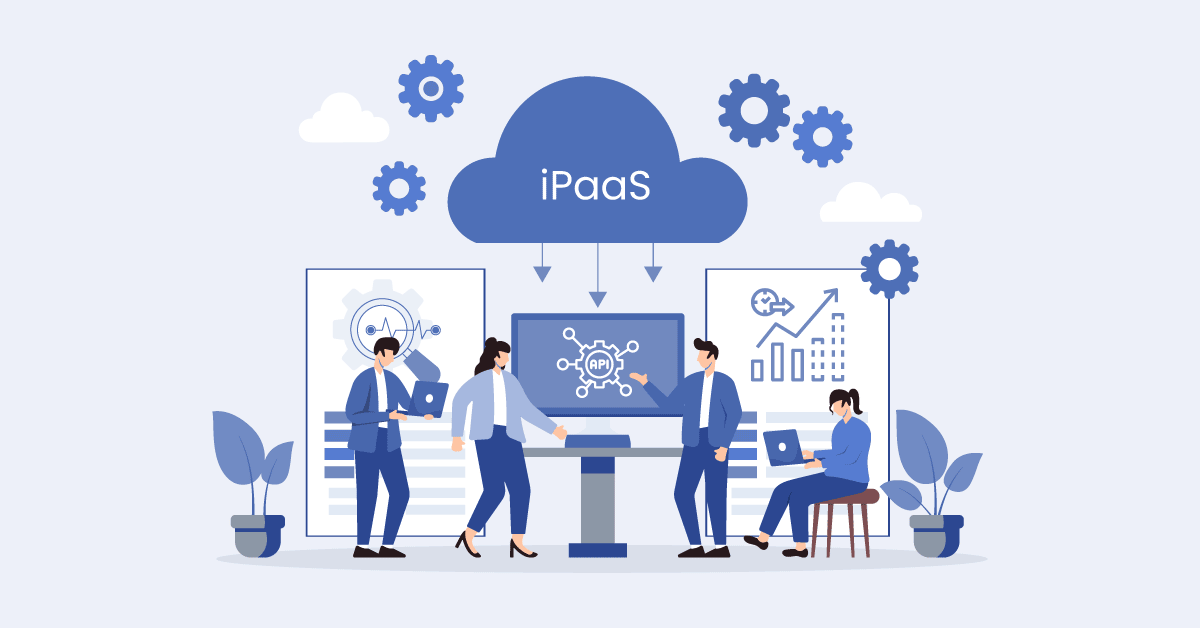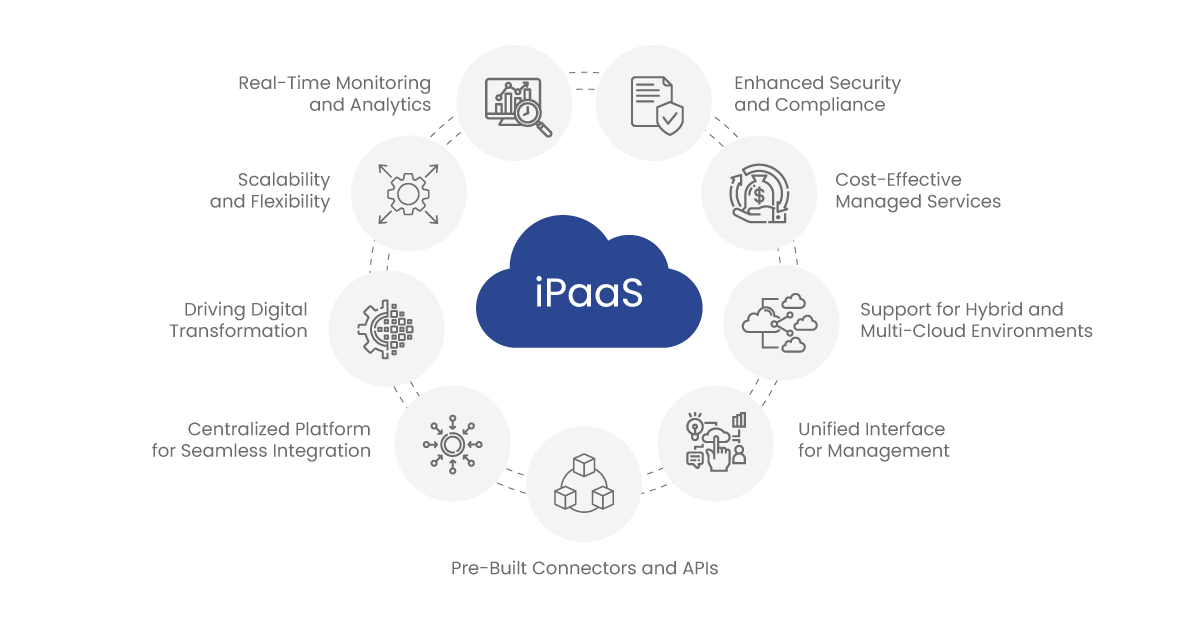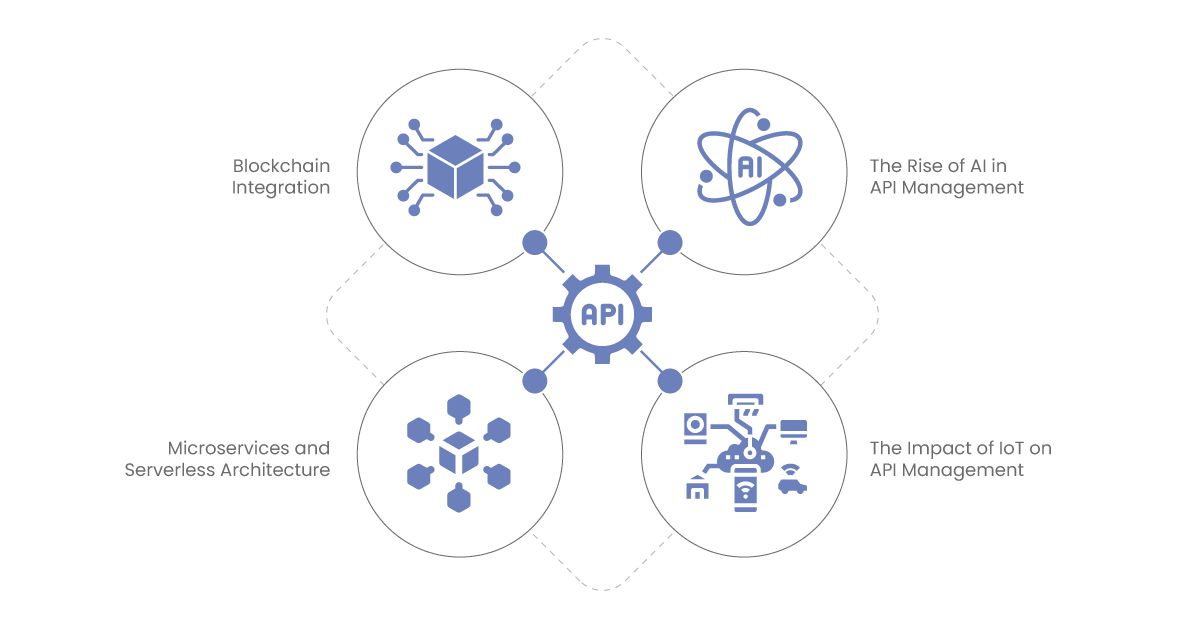In today’s digital world, software development and integration revolve around strong API management. As technology keeps advancing, businesses need to stay ahead by understanding and adapting to the latest trends in API management. And, as many experts emphasize, iPaaS (Integration Platform as a Service) is crucial to this journey.
In this blog, we’ll explore the current landscape of API management, dive into future trends and predictions, and examine the significant role iPaaS plays—and will continue to play—in shaping this domain.
Let’s understand API Management.
Aonflow iPaaS – Free for First 3 Months!
Build and run up to 1,500 transactions monthly with no cost. No payment info needed!
What is API Management?
The process of developing, describing, releasing, and protecting Application Programming Interfaces (APIs) to facilitate the integration of different software systems is known as API management. This is a strategic method followed by organizations to help in making software integration processes faster. API management consists of important parts:
- Style: API designs must be elegant and intuitive such that they can cater to the expectations of developers as well as architects.
- Documentation: Comprehensive documentation is key to enabling the effective usage of an API through clear instructions, examples, and best practices.
- Security: APIs typically manage sensitive data and further security measures need to be in place.
- Observability + Analytics: watch how API is leveraged, ingest data to streamline performance, flag potential issues getting into the wild sooner, and allow actual informed decisions to be made based on real metrics.
API management using the right practices enables organizations to integrate easily, work smarter, and fast forward their digital transformation journey.
What is the Role of iPaaS in API Management?
iPaaS, as a cloud-based integration solution, enables organizations to connect various systems, applications, and data sources through a centralized platform. iPaaS provides a unified interface for managing integrations, offering pre-built connectors, APIs, and tools to streamline data exchange and application connectivity. Its cloud-based nature eliminates the need for on-premises infrastructure, providing scalability and flexibility.
Centralized Platform for Seamless Integration
iPaaS, or Integration Platform as a Service, revolutionizes API management by providing a cloud-based integration solution that enables organizations to connect various systems, applications, and data sources through a centralized platform. This centralization is crucial for businesses aiming to streamline their operations and achieve seamless data flow across disparate systems.
Pre-Built Connectors and APIs
One of the significant advantages of iPaaS is the availability of pre-built connectors and APIs. These pre-built components are designed to integrate with popular cloud-based applications, services, and data sources effortlessly. This feature reduces the need for extensive custom development, allowing organizations to implement integrations faster and more efficiently.
According to a 2023 report by MuleSoft, 63% of organizations using iPaaS experienced faster integration times compared to traditional middleware solutions.
Unified Interface for Management
iPaaS provides a unified interface for managing integrations, which simplifies the overall integration process. This unified interface allows organizations to configure, monitor, and maintain their integrations from a single platform. By centralizing integration management, iPaaS reduces complexity and enhances operational efficiency.
Scalability and Flexibility
The cloud-based nature of iPaaS offers unparalleled scalability and flexibility. Unlike traditional on-premises middleware solutions that require additional infrastructure setup and maintenance to scale, iPaaS can easily adapt to changing business needs. Organizations can scale their integration capabilities up or down as required without the need for significant additional infrastructure investment. This scalability is particularly beneficial for growing businesses or those with fluctuating integration demands.
Cost-Effective Managed Services
iPaaS providers often offer managed services that include infrastructure management, updates, security, and monitoring. These managed services relieve organizations from the burden of maintaining and managing the integration platform themselves, allowing them to focus on core business activities. This approach not only reduces operational costs but also ensures that the integration platform is always up-to-date and secure. Organizations using iPaaS can reduce their integration management costs substantially.
Enhanced Security and Compliance
Security is a paramount concern in API management, and iPaaS platforms are designed to address this need effectively. iPaaS providers implement robust security measures, including encryption, authentication, and regular security audits, to protect data and ensure compliance with industry standards and regulations. This focus on security helps organizations safeguard sensitive information and maintain trust with their customers and partners.
Real-Time Monitoring and Analytics
iPaaS solutions come equipped with advanced monitoring and analytics tools that provide real-time insights into API usage and performance. Organizations can use these tools to track API consumption, identify bottlenecks, and optimize their integrations for better performance. Real-time monitoring also enables proactive issue resolution, reducing downtime and improving the overall reliability of integrations.
Support for Hybrid and Multi-Cloud Environments
In today’s diverse IT landscape, many organizations operate in hybrid and multi-cloud environments. iPaaS platforms are designed to support these environments, enabling seamless integration across on-premises systems, private clouds, and multiple public cloud providers. This versatility ensures that organizations can leverage the best of all worlds, maximizing their technology investments and achieving greater agility.
Driving Digital Transformation
Ultimately, the role of iPaaS in API management extends beyond technical integration. By enabling seamless connectivity between systems and data sources, iPaaS empowers organizations to innovate, streamline operations, and drive digital transformation. Businesses can leverage iPaaS to create new products and services, enhance customer experiences, and gain a competitive edge in the market.
How API Management works today?
Market Overview
The API management market has experienced significant growth in recent years, driven by the increasing demand for seamless integration and the rapid adoption of cloud computing. Organizations across various industries recognize the value of APIs in enabling digital transformation and are leveraging them to create innovative solutions.
Leading API management platforms offer a range of features, including API gateways, developer portals, and analytics tools, to manage, secure, and analyze APIs effectively.
Challenges in API Management
Despite its benefits, API management presents several challenges:
- Security: APIs often handle sensitive data, making security a paramount concern. Robust authentication mechanisms, encryption protocols, and regular security audits are essential to protect data.
- Integration Complexity: Managing the integration of multiple APIs from different providers can be complex, requiring consistency and compatibility across various authentication mechanisms, data formats, and rate limits.
- Scalability: Organizations need to make sure their API management infrastructure can support higher loads and continue to provide optimal performance as the number of APIs increases.
Delivering scalable infrastructure, centralized control points for managing all APIs, and capabilities like API transformation, orchestration, and mediation, API management systems can assist lessen these difficulties.
What are the Future Trends in API Management?
The Rise of AI in API Management
API administration is about to undergo a revolution thanks to artificial intelligence (AI). Security, monitoring, and analytics are just a few of the API administration tasks that AI-powered technology can automate.
Machine learning algorithms can proactively anticipate possible problems, identify abnormalities, and evaluate trends of API usage. By instantly identifying and stopping threats, AI can further improve API security by guaranteeing the confidentiality and integrity of data sent over APIs.
The Impact of IoT on API Management
The Internet of Things (IoT) is rapidly growing, with an increasing number of devices connected to the Internet. Effective API management is essential to enable seamless communication and data exchange between devices and applications.
API management platforms must adapt to the unique challenges posed by IoT, such as managing large volumes of data generated by IoT devices and ensuring secure and reliable connectivity.
Microservices and Serverless Architecture
The adoption of microservices and serverless architecture is set to shape the future of API management. These architectures improve flexibility and agility by allowing enterprises to create more scalable and flexible APIs.
Microservices allow for the development of small, independent services that can be deployed and scaled individually, while serverless architecture enables developers to build and run applications without managing servers.
Blockchain Integration
Blockchain technology is gaining traction across various industries, and its integration with API management is expected to offer enhanced security and transparency.
Blockchain can provide immutable records of API transactions, ensuring data integrity and reducing the risk of fraud. This integration can be particularly beneficial for industries such as finance, healthcare, and supply chain, where data security and transparency are paramount.
Aonflow is the leading integration platform.
You can kick-start by integrating your first-ever workflow in just a matter of minutes.
Predictions for API Management
The Role of API Management in Digital Transformation
API management will play a crucial role in industry-wide digital transformation projects. Businesses will use APIs to embrace cloud-based solutions, combine disparate systems, and develop cutting-edge goods and services. By enabling seamless integration and data exchange, API management will drive digital transformation and support business agility.
Predicted Technological Advancements
Technological advancements such as AI, IoT, microservices, serverless architecture, and blockchain will shape the future of API management. These advancements will enable organizations to build more modular, scalable, and secure APIs, enhancing flexibility and agility. As organizations continue to adopt these technologies, the demand for robust API management solutions will grow, driving further innovation in this space.
Enhanced Developer Experience
As API management evolves, the focus on enhancing the developer experience will intensify. Developer portals will become more sophisticated, offering advanced tools, comprehensive documentation, and interactive tutorials to facilitate API consumption and integration. Organizations will invest in creating developer-friendly environments to foster innovation and collaboration.
Increased Emphasis on Security and Compliance
As cyber threats continue to evolve, the emphasis on API security and compliance will increase. Organizations will adopt advanced security measures, such as AI-powered threat detection, encryption, and regular security audits, to protect their APIs and data. Compliance with industry standards and regulations will also become a top priority, with API management platforms offering built-in compliance features to ensure adherence.
Get prepared for the Future of API Management
Necessary Skills for Future API Management
As API management becomes more complex, organizations will need professionals with the skills to navigate this evolving landscape. Key skills include:
- API Design: Expertise in designing well-structured, intuitive APIs.
- Security: Knowledge of robust security measures to protect APIs and data.
- Analytics: Ability to analyze API usage patterns and make data-driven decisions.
Organizations should invest in training and hiring professionals with expertise in these areas to ensure effective API management.
Strategies for Adapting to Future API Trends
Businesses need to work out how best they can respond to make more of the next wave of API practices. Key considerations include:
- Stay informed: Stay up to date on trends and new technologies in the industry.
- Work With Experts: Engaging with a team of API experts means that you can leverage their expertise.
- Assess & Update: The most important of them all is the continuous assessment and updating of your API management infrastructure.
Implementing these tactics will allow enterprises to better navigate the changing API management world and take advantage of new ways for innovation and growth.
Conclusion
At its core, API management is one of the most sophisticated areas companies must master to excel in the digital era. The information regarding the current landscape, upcoming changes, and future predictions in API management would help organizations to be ahead of time thus unlocking new doors for them which may lead them toward innovation.
iPaaS will be key to this journey, facilitating seamless integration, improving business operations, and driving digital transformation. While technology will continue to change, organizations need the proper tools and know-how in place to react, run with new trends, and be able to have successful API management.
Aonflow iPaaS – Free for First 3 Months!
Build and run up to 1,500 transactions monthly with no cost. No payment info needed!


